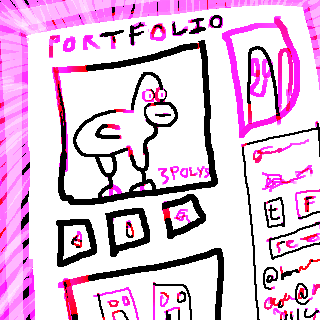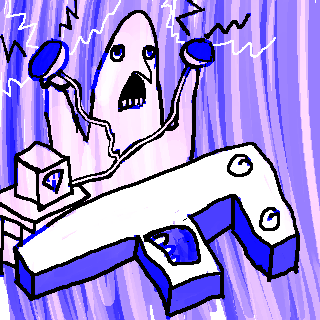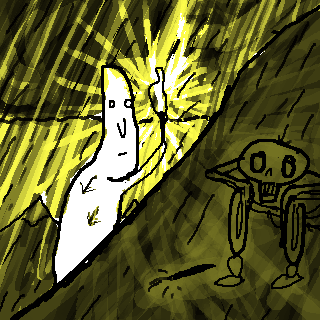Trending
Opinion: How will Project 2025 impact game developers?
The Heritage Foundation's manifesto for the possible next administration could do great harm to many, including large portions of the game development community.
I recently wrote a short article for this year's games design graduates from the University of Huddersfield with some advice for their first year in the big wide world. Also an essential read for current students or those who studied in similar fields.


In the drop of a hat, you're a graduate. A tremendous congratulations to any games design student who has found out their final year results from University recently, great to see that the work paid off. I cannot emphasize enough that whilst you all deserve a couple of weeks to chill out and spend some quality time with those you care about, this is where the work starts.

You are a games designer right now!
If you're going to remain involved in games design, the crucial thing to keep you anchored to the industry is you must develop games. If you haven't had previous work in the games industry, terror may rush into your mind when you realise you're in the unemployment loop.
"You don't have any experience so companies won't give you experience in the form of a job so you don't have any experience (And so on)."
Whilst for a lot of graduates on different courses in this situation may turn towards the job center, those aiming to work in the games industry aren’t bound to the same fate - if you can't find a job being a games developer, you can make one! Come along to game jams, join a team of developers or build your own stuff! When you start building your own games, it will fuel your passion and so many doors will swing open for you. Game Jams are perfect for portfolio work as you get so much work done in such a short period of time, and that's what the industry wants - quality and efficiency. They offer a vertical slice of the production pie in a stupidly short time and it's super fun. The gamejam I run literally lasts 12 hours and we still get games built!
When talking to Formerdroid Managing Director Fee Stewart a couple of months back, she emphasised that: "Game jams should be an integral part of learning as a student, but not enough students get the experience and thrill of producing a game in a team environment in a short period of time."
Useful sites related to the above:
http://forums.tigsource.com/index.php?board=3.0 - Tigsource has a plethora of paid and free work. Also has a tonne of useful information and contacts. Check them out.
http://compohub.net - Site perfect for finding gamejams across the world. Get involved right now!

Get into a routine of posting up work
If you haven't already, set up a Twitter account and start posting up your work as often as possible. I know many of my friends on the course weren't fond of using social networking, but Twitter is an essential tool as a developer. Posts can be short and concise so won’t take up too much of your day. It’s better to post a constant stream of little bits of your work than in bulk in infrequent posts, as it keeps you on the radar of the community and potential employers. Promote other developers and keep a sharp eye out for opportunities to collaborate. You will make so many contacts in the industry since Twitter gives you a direct line with big names which you'd end up emailing and never getting a reply from. I've landed gigs at EGX Rezzed, Insomnia and all over the country from keeping an eye on Twitter feeds. As for posting up work with lots of visual eye candy, Tumblr gives you a clean simple layout with no ads.
Here's an article I wrote on using Twitter: http://www.gamasutra.com/blogs/AlexJohansson/20140628/219533/DailyDevPromo__Helping_promote_fellow_developers_in_bite_sized_chunks.php

Use EVERYTHING the University offers
You're going to learn very fast (especially with that delicious debt hanging over your head) that anything that you can get for free is gold. If you think graduating means the university loses interest in your growth and future, this is a terrible mistake. There are fantastic programs such as enterprise grants, office space and even work available. Let's not forget the lists of alumni and the potential audience of students the University has to showcase work to (and rally their support behind you). If you end up settling for an ordinary job after University, students forget that it's also a waste of time on the sides of the teachers who have invested years into your future. They want you to succeed. If the University alumni for games design is littered with success stories, it's going to work in their favour, so they will give you whatever you need to succeed (and if not, you are well within your right to request it). The number of times that I used the University facilities in the last year is ridiculous, and as of this year I have access to office space and business advice for a year entirely free of charge, courtesy of the University. ASK AND YOU SHALL RECIEVE.

Get a decent portfolio
Purchase a domain (Most are between 5 to 10 quid for a couple of years) then get your site set up. Cough up the cash and ditch your Wix/Moonfruit/Carbonmade account. Hosting space is dirt cheap - got mine for less than 5 pounds setup costs which provided eternal storage and support. Get hold of a copy of Dreamweaver or find a template. Get a website thrown together and keep it updated! If you don't have the time to learn web design software, contact students doing web design from your university and offer payment through beer/pizza to avoid getting ripped off by pricey professionals. It's a win win since they can use the site for their own portfolios whilst you get a website that'll look awesome. Take the time to only put up your best work. Remember, you're only as good as your weakest piece.
But
This doesn't mean chickening out on posting any work because you're convinced it's not good enough, just use a parallel blog to post up general work whilst the portfolio holds the juicy stuff. Make sure to give it plenty of variety, as having a portfolio with 25 high poly guns is great but restricts your employment opportunities to that niche. Get your email on there and make sure it's on every page and very easy to access as if not, there's another thousand people who do.

NETWORKING NETWORKING NETWORKING
The games industry hierarchy is so flat! Even in Yorkshire (North of England) there are SO MANY DEVELOPERS that you can get in contact with. I was sat on a train going to my University town and just by coincidence one of the developers from No More Room in Hell was sat across the table from me. Not only that, but there are events and meet ups in every city where they even buy you drinks for free. FREE (Note: Don't be the jerk who expects a free drink). I went to an entirely free industry talk recently in Sheffield that had half the seats empty on a panel with the head of Sumo, Four Door Lemon and a bunch of other major players from around the area who were practically throwing themselves at people for networking. Get cards printed and scour your town for a game developer network. Not one set up? Get one set up, and people will come. I established HudDevField in the Huddersfield area around December and the group has grown to over a hundred strong community with a monthly meetup and gamejam.

Keep your University Communities Alive
On the subject of communities, most of you have course groups on sites such as Facebook. Just because you finish university doesn't mean that you can't still support each other. You get a job in a company? Put in a good word for a friend or give them the heads up on job openings. If there's one thing better than working in the world of games, it's doing so with your mates. Aj Grand-Scrutton of Dlala studios did a talk a while back in which he described the joy of being able to get his mates jobs after establishing his company.
The other part to keeping these groups active is helping the next generations of students coming through the same course. Give them the advice you wish you'd have had and prevent them making the same mistakes. These are favours that will come back around. Keeping the groups going will also allow you preserve links with old friends and to meet new people which is an absolute must after University, as a sad fact is many branches of the social tree will wither and die (especially if you're spending most of your day crunching on a game). Remember - Friends will keep you strong when times are bad and you will all have a much better chance finding jobs in the industry united than alone.

Don't Give up
I know that most people say that second year or final year are the hardest years to deal with, but I would say most definitely the first year after University is the hardest. You will experience so many changes in your life, but the thing that you need to keep consistent is your passion for games. If you make it through this first year after graduation and you're still interested in games development, people will see you as that bright spark refusing to go out. Working hard is great, but working persistently is harder and crucial. DON'T LET THAT LIGHT GO OUT.
So many people from university will leave and do something miserable and boring after investing so much passion in their course, this doesn't have to be you! The resources, community and audience are right at your fingertips and all you have to do engage yourself and the most wonderful job in the world is yours for the taking.
If any of you have any questions, need advice, help or support, don't hesitate to drop me a message on Twitter @alexvscoding or email me at [email protected], as I'm always happy to help.
I wish you all nothing but the best.
Alex
Read more about:
BlogsYou May Also Like